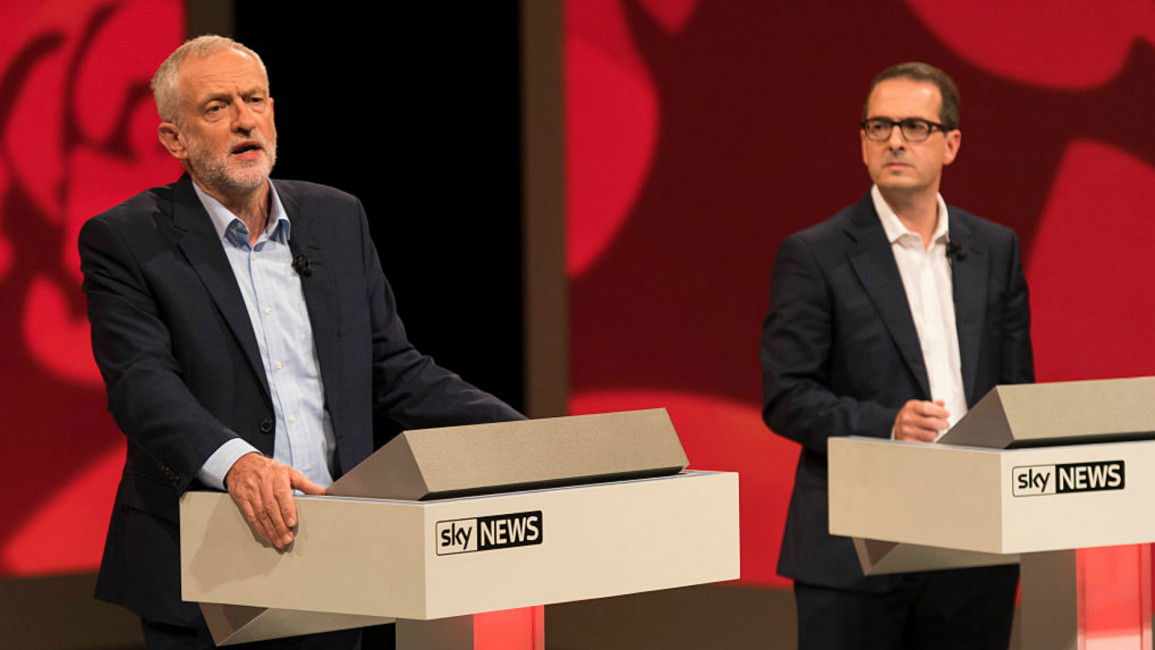
Corbyn and Smith vie for Middle East credibility
The result of the election to determine the leader of the UK parliament's official opposition will be announced tomorrow at the Labour Leadership Conference. All the indicators are that incumbent Jeremy Corbyn will withstand the fierce campaign against him, and defeat his challenger Owen Smith.
Hours of debate over the summer have seen the two candidates setting out their stalls, and while the Middle East has not been a major issue of contention, the differences between the Corbyn and Smith are informative and indicative of what the future holds for Labour under two possible scenarios: A Corbyn victory and consolidation of power, or eventual success for the coup against him.
Smith on Palestine
Both candidates were asked by Labour Friends of Palestine and the Middle East (LFPME) to provide statements on the Israel/Palestine conflict. Smith's statement was vague and platitudinal, while Corbyn's was more specific and bore little resemblance to the traditional line taken by powerful British politicians. Most importantly, two contrasting views of the UK's role in the Middle East were revealed.
Owen Smith's statement calls for a "safe and viable" Israel alongside a "viable" Palestine. This omission of safety for the Palestinians suggests a continuation of the profound bias towards Israel under Labour's erstwhile prime ministers, Tony Blair and Gordon Brown.
Smith supports negotiations in which the sides have "equal status" and negotiate "in good faith" but there is no explanation of how this could be brought about, and no mention of the current context which makes this impossible.
Smith voted to recognise a Palestinian state in 2014, and his tone is similar to that of Ed Miliband in being conciliatory to the Palestinians while lacking the substantive policies that would make a real difference. On the Labour website he states that he would "recommit… to an ethical foreign policy" - the same phrase used by Labour Foreign Secretary Robin Cook who oversaw policies that were anything but ethical.
Corbyn on Palestine
Jeremy Corbyn's LFPME statement sets out his approach, should he retain his crown.
Corbyn calls for both Israel and Palestine to be "safe and viable" and an end to "the double standards" of Israeli rights being upheld as Palestinian rights are ignored.
The Labour leader is also much more specific and detailed in setting out his approach. He will "fully support the calls for an arms embargo" on Israel and promises "escalating consequences" for Israel should it not stop its human rights abuses.
In a version of the statement not published by LFPME, Corbyn talks about the Separation Wall as "designed to annex Palestinian land and undermine chances for a future peace settlement".
 |
Corbyn calls the blockade of the Gaza Strip "collective punishment" |  |
Regarding illegal settlements, Corbyn calls them "a conscious policy to deliberately undermine any prospect of a viable Palestinian state and with it any two-state solution" and says he supports ending "all trade and investments with the illegal settlements".
Corbyn calls the blockade of the Gaza Strip "collective punishment" and points out that the majority of the people of Gaza are refugees. Although he does not elaborate further on the refugee crisis, there is ample evidence elsewhere that Corbyn understands the absolutely pivotal role of the Palestinian right of return in securing a genuine peace settlement.
Differing visions
Perhaps the most significant difference between the two rivals on Israel and Palestine can be found in how they view the UK's role in the conflict. Smith thinks that "the most important task is to help foster cooperation and coexistence between both sides".
 |
Smith, or whoever replaces him in a future challenge to Corbyn, will want to maintain the party's time honoured pro-Israel stance |  |
In contrast, Corbyn sees it as imperative for the Labour leader, even in opposition, to "facilitate a peace process".
Corbyn's solution-focused approach suggests a sea change in Labour's relationship to Israel, while the evidence is that Smith, or whoever replaces him in a future challenge to Corbyn, will want to maintain the party's time honoured pro-Israel stance, albeit with the adoption of even-handed rhetoric.
Distortion campaign
The perception of Smith as opportunistic has not been helped by his seizing upon false accusations of antisemitism made against Corbyn's leadership. The distortion campaign has been discredited but the attempt by Smith to defame Corbyn on this issue shows a willingness to play politics with Middle East peace and further confuses two completely different things: anti-Zionism and antisemitism.
A conviction politician, Jeremy Corbyn knows that Israel has long enjoyed diplomatic, legal and economic impunity from the UK and that justice for Palestinians will only come from changing this enabling relationship.
Corbyn's opponents might balk at the prospect of a new foreign policy, but it is his conviction on Israel/Palestine and other key issues that will secure his victory in this election.
Tom Charles is a London-based writer, editor and literary agent. He previously worked in the UK parliament, including as a lobbyist for Palestinian rights. He has contributed to Jadaliyya and the Journal of Palestinian Refugee Studies.
Follow him on Twitter: @tomhcharles
Opinions expressed in this article remain those of the author and do not necessarily represent those of The New Arab, its editorial board or staff.


![President Pezeshkian has denounced Israel's attacks on Lebanon [Getty]](/sites/default/files/styles/image_684x385/public/2173482924.jpeg?h=a5f2f23a&itok=q3evVtko)



 Follow the Middle East's top stories in English at The New Arab on Google News
Follow the Middle East's top stories in English at The New Arab on Google News


